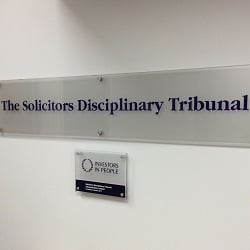
SDT: Lack of supervision not an excuse
A solicitor’s misconduct cannot negate a non-solicitor employee’s misconduct or shield them from being banned from working for law firms, the Solicitors Disciplinary Tribunal (SDT) has ruled.
The tribunal refused a rare appeal against an order made by the Solicitors Regulation Authority (SRA) against Roger Patrick Diavewa under section 43 of the Solicitors Act 1974, under which it can ban non-solicitors from working for law firms without its permission.
The SRA banned him last September after an adjudicator found that he had “falsely held out” both to his client and to the Family Court that Calices Solicitors, based in East London, continued to act for the client.
Further, Mr Diavewa failed to submit a form to the Upper Tribunal within the time limit, leading to an automatic strike-out. He failed to inform the client or the firm he worked for, and later created a false version of the form and letter that purported to show it had been submitted in time.
He was found to have acted dishonestly both in connection with this and by receiving “into his own personal account” payments from a client of the firm.
Mr Diavewa had been employed by a sole practitioner, ‘MS’, as a self-employed paralegal between 2014 and 2018.
His advocate told the tribunal that MS, by his own admission, neglected the practice much of the time and this materially affected Mr Diavewa’s conduct.
The result was that he was not supervised effectively or at all “and had to use his initiative”.
He challenged the banning order on the grounds that it “failed to take account of and/or give due weight to the role and defaults of MS”.
The tribunal noted that Mr Diavewa was “an experienced legal executive who had also worked at other firms”.
There “naturally” had to be some supervision, but it rejected the argument that he needed to be told what to do at all times in order to comply with his obligations.
The adjudicator had actually taken evidence from MS and not disregarded his role, it said.
“In any event, misconduct on the part of a solicitor could not negate misconduct on the part of an employee or shield that employee from being made subject to a s43 order where misconduct had been established on the part of him/her.”
The tribunal dismissed other arguments that the adjudicator was biased and the ruling was published too early, before the review period had expired.
Insofar as there had been a “misunderstanding about the timescales for publication”, this could not vitiate the section 43 order.
The SDT confirmed the order and ordered Mr Diavewa to pay costs of £3,000.
The case was also unusual because Mr Diavewa was represented by a disbarred barrister, Joe Sykes. The SRA opposed this.
However, the tribunal said it had been “struck by the limitations” of Mr Diavewa’s skills “in presenting his submissions on this discrete point” and said it was satisfied that it was in the interests of justice for Mr Sykes to represent him.












Leave a Comment